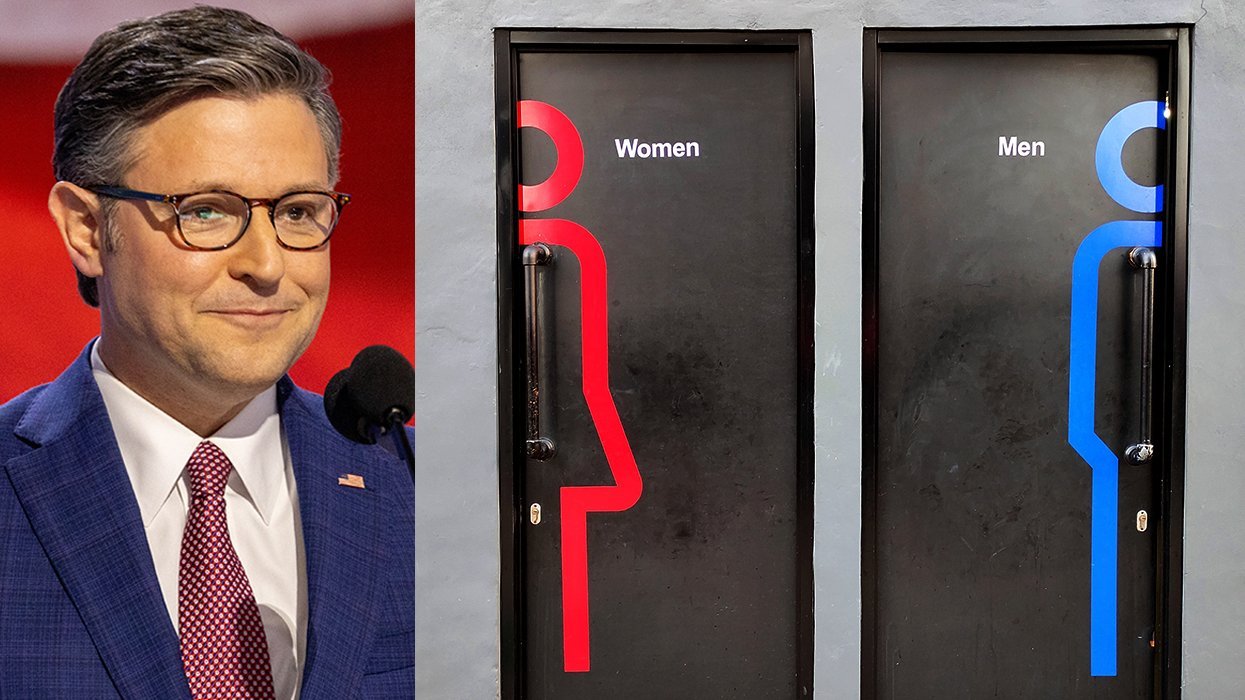Mike Bosia and Steven Obranovich, of Hardwick, Vt., were married three years ago after Vermont legalized same-sex marriage. As Bosia's spouse, Obranovich is entitled to health insurance through Bosia's employer, Saint Michael's College in Colchester.
But that coverage comes at a cost.
The couple estimates that they have had to pay $4,500 in additional federal income tax and filing-related expenses because the federal government is prohibited by the Defense of Marriage Act from recognizing same-sex marriages. Bosia, 51, has to pay that tax on the value of the health coverage he gets for Obranovich, 45.
Bosia says the difference in tax treatment at the state and federal levels creates headaches for the couple's accountant at tax filing time.
Dealing with the different rules, he says, "takes more time and costs more."
According to a report published by two think tanks, the Center for American Progress and the Williams Institute, which conducts research on gender identity and sexual orientation, an employee who buys health insurance for a domestic partner of the same or opposite sex pays $1,069 more a year in federal taxes, on average, than a worker in a heterosexual marriage would pay for the same coverage.
Nine states and the District of Columbia currently permit same-sex marriage, according to the National Conference of State Legislatures.
Last month, the Supreme Court heard oral arguments in two cases that relate to same sex marriage. In addition to the challenge to DOMA, the court considered a California-based case challenging whether states can ban same-sex marriages.
The rulings are unlikely to have a direct impact on same-sex couples in domestic partnerships or civil unions, says Tara Borelli, a staff attorney at Lambda Legal, an advocacy organization for lesbian, gay, bisexual and transgender people.
A decision by the court that DOMA is unconstitutional might eliminate significant barriers that same-sex married couples face related to health care and health insurance. The inequity in federal tax treatment is the most obvious hurdle, but it's not the only one.
Federal laws that protect workers and their families from losing health insurance don't apply to same-sex married couples. Under the federal law known as COBRA, for example, workers at many companies can hang on to their job-based health insurance for themselves and their families for up to 18 months in most cases. But the law doesn't offer this guarantee to the same-sex spouses of former employees.
Likewise, under federal law employees can add a new spouse to a health plan immediately, and if your spouse loses group health coverage, he or she can generally switch to your plan without waiting for the annual enrollment period. These protections don't apply to same-sex married couples.
The Family and Medical Leave Act allows eligible employees unpaid time off to care for a seriously ill family member, but it doesn't apply to same-sex spouses.
Companies are increasingly providing benefits to same-sex couples, even if they're not required to. Last year, 54 percent of employers with 10 or more workers offered same-sex health insurance benefits, up from 24 percent in 2008, according to Mercer, a human resources consulting firm.
"There's certainly been remarkable progress among companies in viewing and treating their same-sex and opposite-sex partners the same," says Deena Fidas, deputy director of corporate equality programs at the Human Rights Campaign, an advocacy group.
Privately insured couples aren't the only ones who may run into difficulty with health insurance. Because of DOMA's definition of marriage, federal employees can insure a spouse only if that partner is a member of the opposite sex.
Moreover, under Medicare, a non-working spouse may qualify for coverage upon reaching age 65 if the working spouse has been employed for at least 40 quarters, usually 10 years. But a non-working same-sex spouse can't qualify on the basis of his or her partner's work history, experts say.
A same-sex spouse may also face difficulties if he or she wants to delay signing up for Medicare after turning 65. The penalty for delaying enrollment may be waived for a married person who has coverage under a spouse's employer-sponsored plan, but if the federal government doesn't recognize the marriage, the penalty may apply.
"Anytime we run into the 'spouse' term, we run into problems for same-sex couples under DOMA," says Brian Moulton, legal director at the Human Rights Campaign.
This article was produced by Kaiser Health News with support from The SCAN Foundation. Kaiser Health News is an editorially independent program of the Henry J. Kaiser Family Foundation, a nonprofit, nonpartisan health policy research and communications organization not affiliated with Kaiser Permanente.


















































































